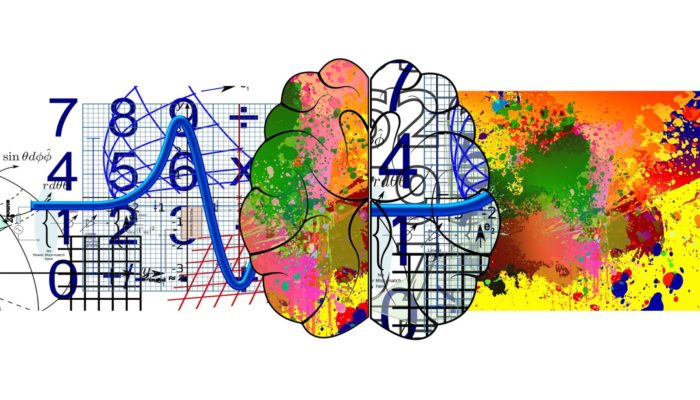
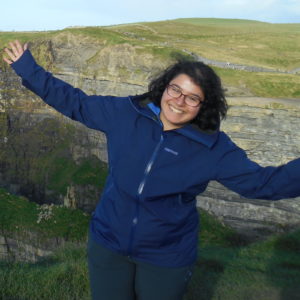
Iris van Zelst – Scientist, editor-in-chief, vlogger and science-communicator extraordinaire
Following from last week’s post on the Science Sisters series, this week we sit with outreach extraordinaire and EGU GD blog editor-in-chief Iris van Zelst to talk about all things scicom, vlogging and a new geological time game that you do not want to miss out on!
Hi Iris, thanks for chatting with us! First things first tell us a little bit about yourself and what you do!
Thank you very much for having me, Antoniette! I am Iris; I am currently a postdoc at the German Aerospace Center although I previously spent time at the University of Leeds, ETH Zürich, and the University of Utrecht. I am studying the evolution of Venus, because planets are COOL. Working on Venus is a bit of a career switch for me (hello, planetary sciences!!), as I previously worked more on the seismology and geodynamics of subduction zones. It’s a career switch I have been wanting to make for a very long time and I am absolutely over the moon that I now get to study planets for a living!!
You are very involved in science communication and outreach both within EGU Geodynamics division and outside of it. You’ve even won grants to support your outreach work – Congratulations! What first sparked your interest and love for science communication? And why do you think this is such an important facet of science?
I have always loved science, particularly Earth sciences and as long as I can remember I knew I wanted to be a geologist/palaeontologist (something Earth-‘sciency’ at the very least). When I was a kid, I was a member of the Dutch Geological Society and I would regularly attend their symposia and activities. I was totally fascinated by everything that was going on, but I did not understand half of what was going on most time. This because with the exception of myself (a ~10 year old, excited, little girl), the entire audience consisted of men in their 50’s or older, and all the talks and activities were (in my eyes) mainly geared towards that audience. So, I vowed to myself that 1. I would become a scientist; and 2. I would never forget what it means to not know something. It’s very easy to assume some basic knowledge (e.g. that the Earth has a crust), but in actuality basic knowledge is not straightforward at all. However when that knowledge is missing, it can be very easy to feel stupid or lost and disengaged from science, which I think is a real shame: just because you don’t know something, doesn’t mean you are stupid, quite the contrary. You just hadn’t come across this new concept or idea yet! And science should be accessible for everyone such that future generations don’t have to have the awkward experience of being the only girl amongst legions of old men listening to a talk on sand deposits!
So, I guess my love for science communication really comes from the desire to help my younger self and inspire future generations. I can be very enthusiastic about things and I’ve been told it can be infectious, so what better way to put that to use than to inspire the next generation of scientists?
In addition, I sometimes feel restricted within science. When you write a paper, or give a talk, there is this pressure to be formal and serious, whereas I have a creative and cheeky side that needs to come out at times. In the past, I have sometimes thought that science isn’t for me, because I am not (and cannot) be that formal and serious all the time, even though I love my research. Science communication allows me to be silly and think outside the box and just ‘let my hair down’. By embracing instead of stowing away my creative side (which was my first instinct when I started my PhD and needed to be ‘serious’), I stay happy and I can do better science overall.
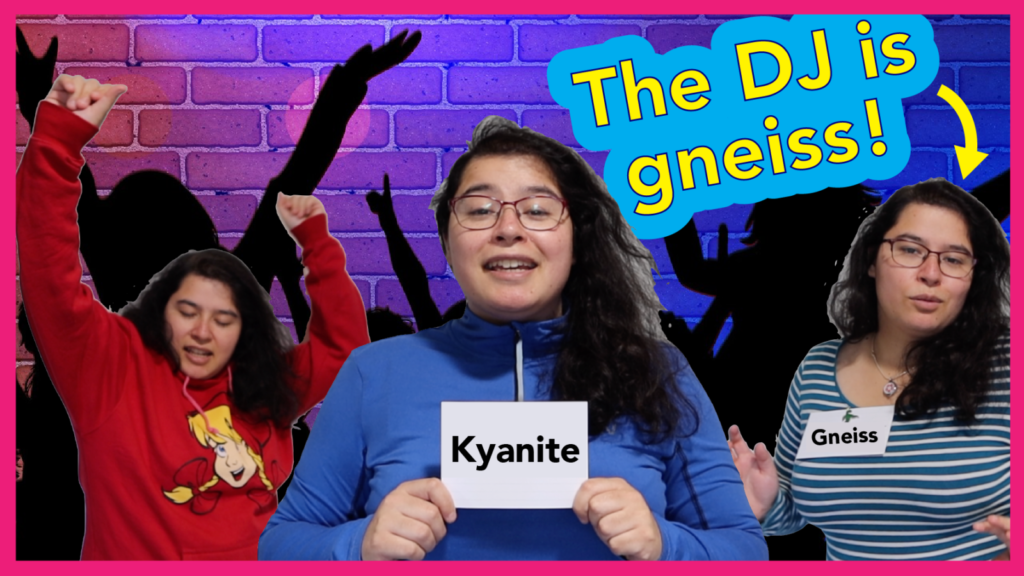
Youtube is a fun creative outlet for Iris, one that allows her to let her hair down and talk about science to a diverse audience in a fun way
That’s such an inspiring motivation! Tell us more about your outreach work. Is there a project that is particularly close to your heart?
I think the project for which I have the biggest dreams, (and which is therefore very close to my heart) is QUARTETnary (and actually, in my mind it is ‘QUARTETnary Games’). This is an educational card game about the geological time scale I am currently developing together with Lucia Perez-Diaz. I feel that the potential behind this project is huge and with enough hard work, we can really make something very cool and exciting. As the name ‘QUARTETnary Games’ suggests, I have multiple fully thought-out games with an Earth-‘sciency’ twist to it ready to go. Now I just need someone to design and illustrate them all. And publish them! And maybe someone should buy them eventually as well! We still have a long way to go… 😅
I also enjoy my youtube channel tremendously, because I am totally free to experiment and try different things. Hence the mix of postdoc vlogs, Science Sisters interviews, together with a lot of plain silly sketches and songs about life as an academic. On youtube I feel very free and there is no pressure (yet), because I do not care about numbers or analytics. Or, put differently: because no one is really watching at the moment, haha. So, please subscribe and like the videos, people! (I knew I’d find a way to get that in here, hahaha). This balances my editorial work on the EGU GD blog which sometimes can feel a little bit restricted since it is not just my name that is attached to these blogs and therefore there is more pressure and responsibility.
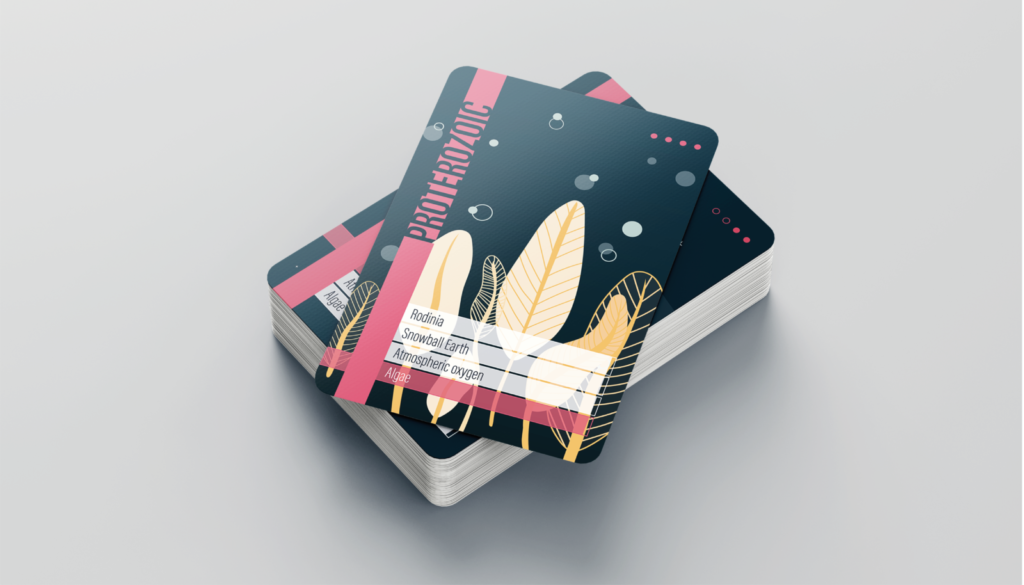
QUARTETnary (Games) – A game about the geological timescale that is in the works by Iris & Lucia
It really shows that you’re having fun on your channel and that you love what you do! Your vlog is absolutely fantastic – it is lighthearted while at the same time provides real insight into postdoc life. What made you pick up the camera and hit record?
My frustration with science! Hahahaha. You never know what other people are thinking or what they are going through, so in my mind all my colleagues were absolutely acing the academic game, while I was just blundering through (hello imposter syndrome!). Add to that the fact that most of the science youtubers and PhD vloggers on youtube that I was following all quit academia after they obtained their PhD to become full-time science communicators and I knew there was a niche that I wanted to be filled: someone should represent the poor postdocs out there with vlogs and jokes and existential crises other people can relate to. So, I filled that gap.
I’m a huge fan of the Science Sisters! Tell us a bit about this offshoot of the vlog, how do you prepare each episode and how do you go from finding the ‘science sisters’ to preparing the questions? Are these more free flowing conversations or do you have specific questions in mind for each episode?
Oh thanks, that’s great to hear! ‘Science Sisters’ was actually an idea I have had for about 2 or 3 years, initially conceived as a podcast with a friend. However, that friend was busy (understandably. Aren’t we all?) and I still really wanted to make something, so when I got the idea of making videos, this was the first thing I had in mind to make. But, I also knew I didn’t have the skills yet to produce it the way I wanted it to. That’s why I started with vlogs and sketches and general silliness to experiment and then as I built more confidence on youtube I eventually felt ready to try out the first season of Science Sisters.
The answer to ‘how do you prepare’ is mainly: not nearly enough. I have certain topics in my mind that I want to discuss and I have an idea for what kind of guests I would like on the show (while keeping an eye out on the balance between women/men and other diversity markers) and then we just start chatting and we have a great time and my ideas go completely out of the window. It’s absolutely terrible to edit, 😅 😂 . My goal is to try and be better prepared for the next season of Science Sisters, such that the ease of the conversation does not necessarily depend on my relationship with the guest and/or the experience of the guest with interviews. Basically I want to be a better interviewer! I’m working on it!
As to how I find my Science Sisters, I do have a whole list of friends/colleagues/people that I think have interesting stories to tell and when I think their stories would fit in a season (I don’t want too much of the same type of things. I want to keep it spicy) I either ask them in conversation or – if I don’t know them that well, or haven’t spoken to them in a long time – I send them a *veeeeery* long e-mail explaining my ideas and what I would like from them. Seems to work most of the time!
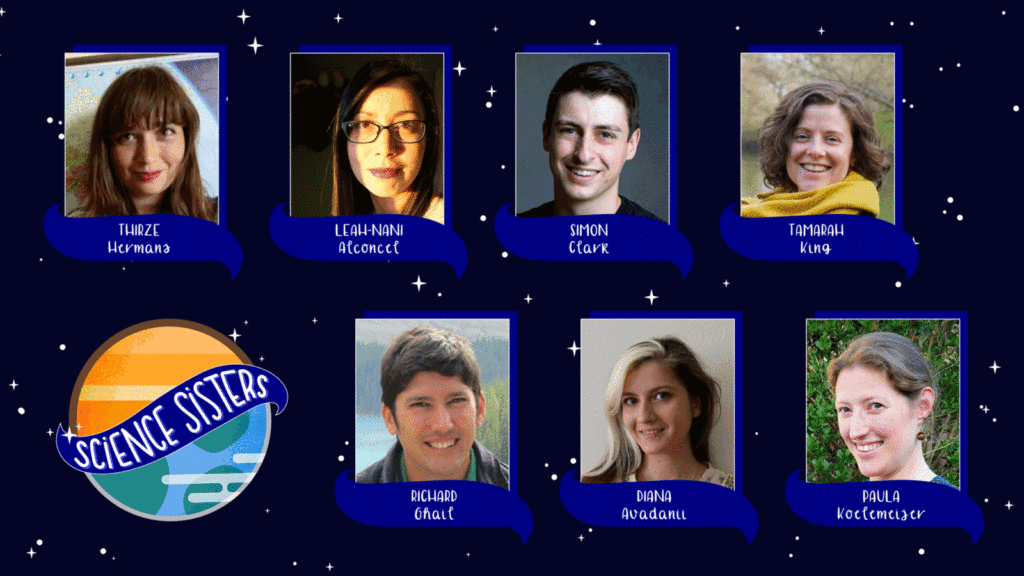
Iris’s guests on Science Sisters season 1! Keep an eye out for more fun interviews in season 2!
Was there a vlog/science sisters episode that was particularly hard or tricky to film and/or upload and why?
Apart from the first episode with Thirze Hermans, which was difficult because it was the first one and I had no idea what I was doing, the episode that was the most difficult to edit was the one with Diana Avadanii. Due to personal circumstances and the fact that I still didn’t really know what I was doing, the conversation did not flow as easily as with some of the other guests. A large part of that was also that I had a topic in mind for the episode which ultimately did not really fit. However, we both had a fun day and I think the final episode is really interesting, as we are talking about all kinds of prejudices and difficulties we might encounter in academia. So, I am still very happy with the end result.
A cheeky question but do you have a favourite episode?
I like all the different episodes, because I think they reflect the people I am interviewing quite well with their different personalities and the different relationships that I have with them. So, they are all special in their own way. However, the one episode that made me cry with laughter during filming, during editing, and still when I see it now, is the one with Tamarah King where we lament the fate of postdocs. It’s the least professional setting, as we are just sitting on my bed in my hotel room in Oxford and it was the first time we actually met in person, but we just hit it off and spent the entire day laughing and crying about the ridiculousness of postdoc life. It was glorious.
That episodes is one of my favourites too! Vlogging can be pretty time consuming! How long does it take you to put one episode together from start to finish?
Oh, this is a hard question, because I never time myself and there are lots of different aspects involved in making a video and it also depends a lot on the video. If something is heavily scripted, filming takes longer, but editing is usually easier. Due to their free-flowing nature, Science Sisters episodes are a pain to edit (I don’t want to subject my audience to 1.5 hours of ramblings between friends) and since I usually visit my guests, actually getting there, setting up the equipment, and just having the (usually quite long) chat be quite time consuming. So on average these episodes can definitely take around 3 or 4 days of full-time work. However, since I have been moving country – I recently made some really short, one-take sketches which take about an hour from start to finish with every aspect of making the video included!
Following from the question above, one of the biggest challenges of academic life (and adult life in general if we are honest) is time management! How do you juggle everything? Do you have any tips and tricks that help you stay on top of things?
Ehm… I don’t juggle everything? As in: I drop the ball frequently!😂 The pandemic has really helped in this regard, because I didn’t have a social life and/or didn’t feel guilty about not having a social life, so I could just dedicate my entire Saturdays to editing and then I would film during the week or on Sundays. But yeah, the time management struggle is real! I’m terrible at prioritising, so I can’t claim that helps me a lot, although a good deadline always helps to keep me on my toes although not too many though, because then it just gets overwhelming😅 I try not to feel too guilty about everything, although repeating that mantra in my head is still quite some way off from actually not feeling guilty. So ehm… I guess my advice would just be to do your best? For me it helps that I mainly see developing QUARTETnary and working on youtube as a hobby, so I can happily spend a lot of free time on that and I also don’t feel too guilty if it takes a few office hours away one week. I know I balance those ‘lost’ office hours with more office hours the next week or when there are big deadlines or conferences. So yeah: don’t feel guilty. Just have fun. With everything you do!
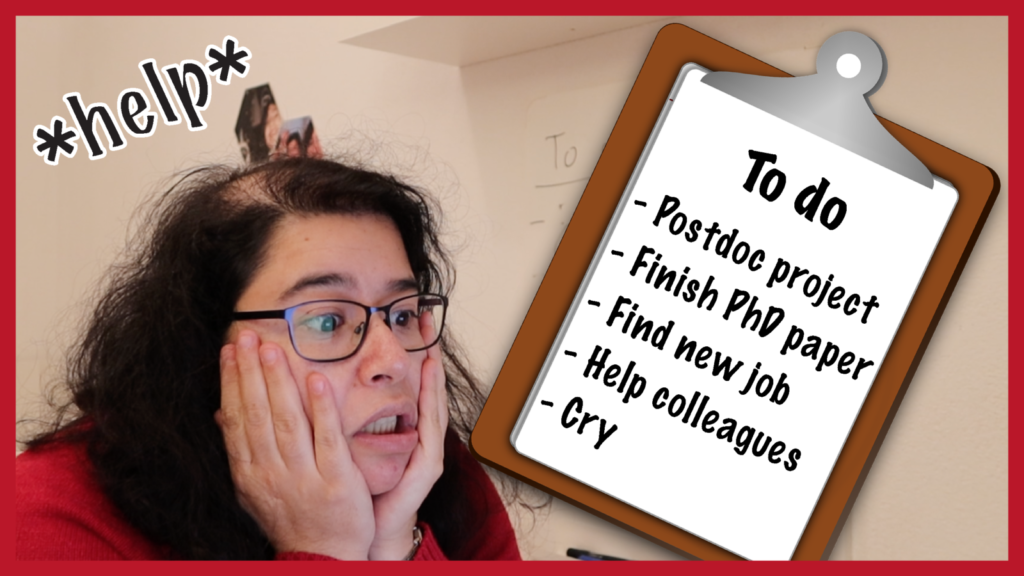
Juggling post-docing, sci. com. and life in general can be tough but the trick, says Iris, is to make sure that you’re having fun!
Thank you Iris! And finally before we wrap this up – any upcoming interesting projects we should keep an eye out for?
There will be a second season of Science Sisters launched at some point in the first half of 2022 and I already have some pretty interesting guests lined up so do keep an eye out for that… Oh and keep an eye out for my paper announcement when it is finally published. It will take quite an interesting shape!
